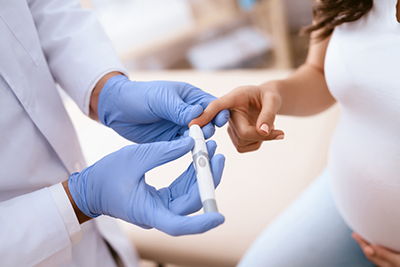 Diabetes can cause problems during pregnancy for women and their developing babies. Poor control of diabetes during pregnancy increases the chances for birth defects and other problems for the pregnancy. It can also cause serious complications for the woman. Proper health care before and during pregnancy can help prevent birth defects and other health problems.
Diabetes can cause problems during pregnancy for women and their developing babies. Poor control of diabetes during pregnancy increases the chances for birth defects and other problems for the pregnancy. It can also cause serious complications for the woman. Proper health care before and during pregnancy can help prevent birth defects and other health problems.
About diabetes
Diabetes is a condition in which the body cannot use the sugars and starches (carbohydrates) it takes in as food to make energy. The body either makes no insulin or too little insulin or cannot use the insulin it makes to change those sugars and starches into energy. As a result, extra sugar builds up in the blood.
The three most common types of diabetes are:
Type 1
The pancreas makes no insulin or so little insulin that the body can't use blood sugar for energy. Type 1 diabetes must be controlled with daily insulin.
Type 2
The body either makes too little insulin or can't use the insulin it makes to use blood sugar for energy. Sometimes type 2 diabetes can be controlled through eating a proper diet and exercising regularly. Many people with type 2 diabetes have to take diabetes pills, insulin, or both.
Gestational
This is a type of diabetes that is first seen in a pregnant woman who did not have diabetes before she was pregnant. Often, gestational diabetes can be controlled through eating a healthy diet and exercising regularly. Sometimes a woman with gestational diabetes must also take insulin.
For most women with gestational diabetes, the diabetes goes away soon after delivery. When it does not go away, the diabetes is called type 2 diabetes. Even if the diabetes does go away after the baby is born, half of all women who had gestational diabetes develop type 2 diabetes later. It's important for a woman who has had gestational diabetes to continue to exercise and eat a healthy diet after pregnancy to prevent or delay getting type 2 diabetes. She should also remind her doctor to check her blood sugar every one to three years.
